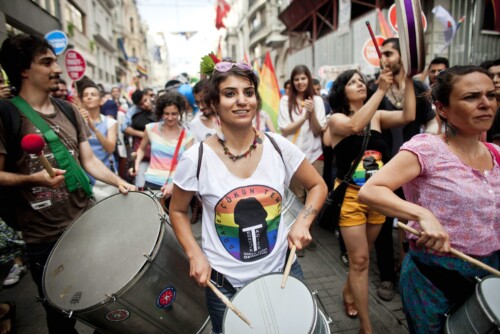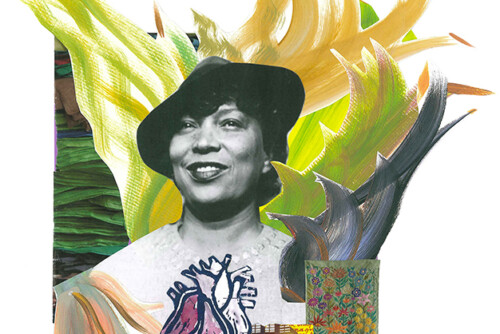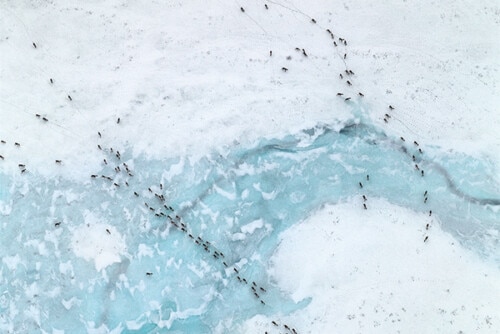Video 10: Moral Panics Around Same-Sex Marriage
GEMA PÉREZ-SÁNCHEZ: Thank you. Moving then to, or expanding on your discussion of the global versus the local, one of the local developments most recently that have impacted LGBT constituents here in the United States has of course been the same-sex marriage decision, the Supreme Court’s decision. You have actually written a piece that is on Human Rights Watch’s webpage, that you published July 26, titled “Supreme Court Decision on Same-Sex Marriage Will Resonate Globally.” I was wondering if you could summarize for our audience what your main points are there, and how you think the transnational LGBT rights agenda of US-based organizations like Human Rights Watch might change now that the US Supreme Court has ruled in favor of marriage equality.
GRAEME REID: I’m going to answer that question by saying firstly that it’s hugely significant, the ruling of the US Supreme Court. It’s certainly not the first country in the world to recognize same-sex marriage, as we’ve pointed out in the amicus brief that we submitted in that case, which was essentially doing a survey of countries in different parts of the world that had introduced same-sex marriage and making the obvious point that it’s happened and the sky hasn’t fallen in, and if it happens in the US, it’s likely to become part of the norm, but the fact of US and the Supreme Court ruled in that way resonates very strongly, and I think in some respects it’s certainly an inspiration, it’s a marker of progress for many people around the world, but paradoxically, what I argue in that particular piece is that it can also cause difficulties for activists who are working in particularly difficult settings. And I use as an example, certainly the way in which Senegal, in Kenya, in Malawi, there have been either rumors or reports of same-sex marriage ceremonies, (of course the marriages themselves are not legally recognized), that have led either to government clampdown, or to arrests, or to incidents of mob violence, so that marriage is used as a kind of specter that inspires a kind of moral panic amongst people. And so, when individuals are asking for the right for an organization to register, for an end to violence and impunity, for non-discrimination in employment, the idea of same-sex marriage is not a helpful one in that particular setting. And even the Nigerian law, the Same-Sex Marriage Prohibition Act, which is a terribly misnamed law, because it is very little to do with same-sex marriage and very much to do with outlawing any form of activism around LGBT issues. I mean, any demonstrable support to organizations that support LGBT rights could result in a ten-year jail sentence. That applies to Human Rights Watch; our work there, in terms of letter of the law, is illegal and subject to ten years, merely for advocating for the rights of LGBT people. So, it’s a particularly pernicious law, but it’s done under the guise of preventing same-sex marriage. Now, interestingly, it was also a reaction to the constitutional court case in South Africa that paved the way for same-sex marriage. Within a month, the Same-Sex Marriage Prohibition Law was introduced within Nigerian parliament. So, there’s a way in which marriage can be used to kind of inspire a moral panic and have a negative reaction to organizations that are fighting for basic rights to freedom of association, freedom of expression.
Video 11: Misinformation and Homophobic Agendas
GEMA PÉREZ-SÁNCHEZ: Earlier you mentioned the methodology of Human Rights Watch, and how careful you are about fact-checking and going underground before you do your reports, and you publish your reports, and you distribute them. Recently, there’s been cases of using misinformation or non-fact checked pieces of news, particularly for conservative agendas. How does Human Rights Watch deal with that issue of misinformation, or the using of actual true facts, but with a particular political agenda, if you could tell us something about how you go about doing that.
GRAEME REID: Having said that the reputation of Human Rights Watch rests on its reliability and accuracy, this is an issue that is of deep concern to us. And there are different ways in which this kind of information circulates. An example is sometimes there are videos that circulate that show, for instance, a very graphic depiction of violence, and those images circulate with different explanations, and sometimes it’s about gay men being stoned in x country or y country, and then they’re picked up and often we don’t know what’s being depicted in that video, so one has to be very careful in terms of the kind of circulation of ideas. An example, also, is the way in which sometimes, and that example that comes up around Iran, for instance, is where, as part of a shaming strategy, people who might be convicted for political reasons can also be accused for example of sodomy or for immoral acts in order to discredit them. So, when that is then taken up by international organizations, it only serves the purposes of the repressive government, which is precisely intending that that [it] will be widely publicized, that this is a gay person who’s been convicted. And, so, one needs to be very careful, also, about how people self-identify. You know, these awful examples of the Islamic state extremists posting videos depicting the execution of people based on sexuality, we don’t know in most cases how the people self-identify, and you need to be respectful, whatever the circumstances. What is happening is, of course, shocking and appalling and atrocious, but one needs to be careful not to just simply latch onto it as a fact because it’s presented in that way. And sometimes that’s extremely difficult, to get that kind of information that is accurate and reliable. But it’s important to hold back until you know what the facts are. And then I think you’re alluding to another aspect, which is in a sense the other side of the coin of the political use of homophobia where a good track record on LGBT rights is used as a way of sort of papering over other human rights abuses. That it can be used in a particular way to say, “Well we’re good on LGBT rights,” so it’s kind of an easy win when there are other human rights abuses that are then ignored, because the LGBT rights are highlighted as being exemplary. And so, you know, one needs to be very careful in how you approach, um, LGBT, and again it’s a strong argument for not separating out LGBT rights from a broader human rights agenda and a broader human rights approach. It’s not good enough that you have a good policy in terms of LGBT rights when there are other appalling abuses that are taking place.
Video 12: Transgender, Intersex, Lesbian, and Children’s Rights
BRENNA MUNRO: So, thinking about the way in which the attention there’s been on gay rights is, in some ways, quite a recent turn within human rights discourse as a whole, which raises the issue of forms of injustice and suffering that aren’t necessarily visible yet to mainstream journalism or human rights activists themselves, so, I wanted to ask you first of all whether you feel there is more attention happening at the moment to trans rights or the injustices faced by gender nonconforming people and Human Rights Watch’s relationship to that, and then if you feel that there’s anything else that is on the horizon that we might not be aware of yet.
GRAEME REID: In answer to the first part of that question, which is really about transgender rights, and that’s something that has been neglected for a long time, and there are very few countries in the world that actually have legislation in place that fully recognizes the rights of transgender people without pathologizing, and a lot of the work that we’ve been doing, and we’ve done work on different issues – the one has been to push back against legislation that unfairly discriminates against transgender people. We did a research report in Kuwait, actually, where there was a law put in place that made it illegal, in terms of the wording of the law, [to] imitate a member of the opposite sex. And, so, transgender women in particular were targeted under this law. So, what had been an uncomfortable but not overly aggressive relation with the police turned into something much more abusive where transgender women were too afraid to go out of their homes, where they were routinely stopped at roadblocks, arrested, abused in prison. And we gauge that there’s not much sympathy for transgender issues within Kuwait, but we focused the report on the excesses of the police and the security forces, which was something that resonated at that time with a broader public within Kuwait who were fed up with the behavior of the security forces, so that’s how we framed that particular report. And we did a similar report in Malaysia recently that, interestingly, in the case there, used the Kuwait report as part of the evidence that was brought, which was a challenge to Sharia law that exists in different regions in Malaysia that does the same thing, it makes it illegal to imitate a member of the opposite sex, and transgender women are targeted, transgender women who are Muslim, because it’s Sharia law, are targeted by that law. And, so, there was a challenge in the constitutional court around the constitutionality of that law, and there was a judgment, a very good judgment, that declared it unconstitutional. That’s under review, and we’ll see what the ultimate outcome will be, but it was a victory for all the transgender community within Malaysia. 1
So that’s one example of kind of challenging the laws, and an ongoing area of work is around the separation of legal gender recognition and medical requirement, and we’ve been doing a series of complaints to the special rapporteur on health and torture based on research that we do in different country settings. For example, we’ve done in Ukraine where there are extreme requirements for transgender people to go through, including spending lengthy times in psychiatric institutions, undergoing extensive medical processes, including irreversible sterilization; we are doing a similar complaint in Kazakhstan, so building up a body of work that’s looking at the way in which transgender people are subject to specific forms of abuse. And we’ve also intervened in the Netherlands, in which the Dutch law similarly links medical procedure to legal gender recognition, there’s a recognition that that needs to change and there’s a process of changing that law, 2 and we did a research report that was based on the experiences of transgender people within the Netherlands and making specific recommendations in order to intervene in the change of the law, because we saw it as significant not only in the Netherlands, but it would be a model for other countries to follow, so it’s very important that the Netherlands get it set right, and we’ve also done work in Ireland around the same issue, when there was a new law introduced in Ireland, so we’ve had a similar engagement around the issue in Ireland. Intersex issues are very underdeveloped. We’ve been having discussions with different entities around that, and some have different approaches as to how they feel the issue is best addressed, and so we’ve been listening to the different sides of how that might be approached, and then I think there’s a challenge around: the UN Human Rights Council report points to a dearth of information about, the experience of lesbians, actually. So you would think because it’s part of the “LGBT” that that is kind of dealt with and out there, but it’s quite striking how little information there is available about the experience, the abuses that are faced by lesbians, and we’re looking at that with a small group of experts drawn from our advisory committee on how we can better address documenting the abuses that are faced by lesbians in a way that recognizes that many lesbians are, out of necessity, invisible, and we need to be able to do research that doesn’t require them to be more visible; so might it be to focus on the experience of single women in terms of access to health care and housing? How might we rethink our research methodology in order to be able to better address the experience of lesbians? And, then, I think that something that is certainly on the agenda, but that we need to address more directly is the intersection of economic inequality, of class, of race, and how these intersect with levels of discrimination and abuse; who is most vulnerable? And to be looking at that more closely. And we also are starting to look in a more systematic way at the rights abuses against LGBT children, so looking at bullying, looking at exclusion from schools. If we go back and look at our reports, the vulnerability and marginalization of adults is almost invariably traced back to the experiences as young people, at home, at school. And so, that’s an area, in collaboration with our children’s rights division at Human Rights Watch, that we’re looking to develop a bigger body of work on. And I think the propaganda laws, too, you know, an under-reported element of them, is the way in which they deprive a particularly vulnerable group of young people from access to objective, reliable information and knowledge.
BRENNA MUNRO: You mean Russia?
GRAEME REID: Yes, I’m talking about Russia, but not limited to Russia, because there are many sort of copycat laws in the region of Russia. But even the laws that exist on a more local level in other places that restrict what is available to kids at school, so limiting sort of comprehensive sex education that includes the experience of LGBT kids, for example, which is quite pervasive in different parts of the world, and how it’s been demonstrated that LGBT kids are vulnerable precisely because they don’t have access to that kind of information, and so to outlaw it, to ban it, to limit it, to restrict it, makes a vulnerable group even more vulnerable.
GEMA PÉREZ-SÁNCHEZ: Thank you very much, this has been a wonderful conversation, we appreciate you taking the time to talk to us.
GRAEME REID: Well, thank you very much for taking the trouble to come and interview me here.
- The Malaysian Federal Court unfortunately overturned the ruling in October 2015, so the law on gendered attire remains ( http://www.reuters.com/article/us-malaysia-verdict-crossdressing-idUSKCN0S21CE20151008). [↑]
- The law in Holland was subsequently changed so that transgender people can change their legal gender without being required to take hormones or undergo surgery or sterilization ( https://www.hrw.org/news/2013/12/19/netherlands-victory-transgender-rights).[↑]



